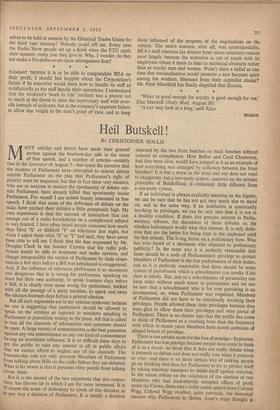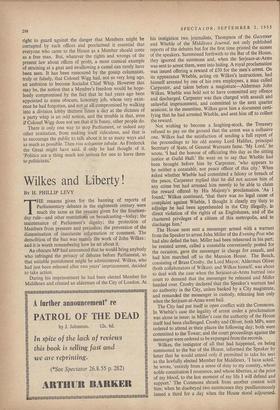Heil Butskell!
BY CHRISTOPHER HOLLIS MANY articles and letters have made their general protest against the fourteen-day rule in the name of free speech, and a number of articles—notably that in the Spectator of August 5—has noted the paradox that the masters of Parliament have attempted to restrict debate outside Parliament on the plea that Parliament's right of priority must be respected, but that in fact these very masters. who are so anxious to restrict the spontaneity of debate out- side Parliament, have already killed that spontaneity inside Parliament. For myself I am indeed keenly interested in free speech. I think that some of the defenders of debate on the radio have pitched their defence a little pompously high. My own experience is that the amount of instruction that can emerge out of a radio knockabout on a complicated subject is very limited. I have often heard people comment how much they liked 'X' or disliked 'Y' on television last night, but when I asked them what 'X' or 'Y' had said, they have never been able to tell me. I think that the fear expressed by Mr. Douglas Clark in the Sunday Express that the radio poli- ticians would be able to dominate and make opinion, and change irresponsibly the verdict of Parliament by their obser- vations a few days before a Bill was introduced is exaggerated. And, if the influence of television performers ik so enormous and dangerous that it is wrong for performers, speaking on none but their own authority, to speak fourteen days before a Bill, it is clearly even more wrong for performers, backed With all the prestige of a party machine, to speak and sway the electors fourteen days before a general election.
But all such arguments are in my opinion irrelevant because no one is suggesting that performers should be allowed to speak on the wireless as opposed to ministers speaking in Parliament or journalists writing in the press. All that is asked IS that all the channels of information and comment should be open. A large variety of commentators is the best guarantee against any one commentator or any one kind of commentator having an inordinate influence. It is so difficult these days to get the public to take any interest at all in public affairs that we cannot afford to neglect any of the channels. The fourteen-day rule not only prevents Members of Parliament from talking about Bills on the radio before they are debated. What is far worse is that it prevents other people from talking about them.
But it is the second of the two arguments that this contro- versy has thrown up in which I am the more interested. It is Of course the acme of dishonesty to speak of this decision as in any way a decision of Parliament. It is simply a decision imposed by the two front benches on back benches without consent or consultation. How Belloc and Cecil Chesterton, had they been alive, would have jumped at it as an example of how everything was arranged by collusion between the front benches ! It is but a straw in the wind and one does not want to exaggerate, but a two-party system, operated on the present principles of Butskellism, is ominously little different from a one-party system.
If an individual is always explicitly, standing on his dignity, we can be sure that he has not got very much else to stand on, and in the same way, if an institution is continually invoking its privileges, we can be very sure that it is not in a healthy condition. If there was genuine interest in Parlia- mentary debates, the discussion of those debates on the wireless beforehand would whet that interest. It is only skele- tons that are the better for being kept in the cupboard until the last minute. The living thrive on a preliminary bow. Who has ever heard of a showman who objected to preliminary publicity? In the same way it is perfectly reasonable that there should be a code of Parliamentary privilege to protect Members of Parliament in the free performance of their duties, just as it is perfectly reasonable that there should be some system of punishment which a schoolmaster can invoke if his class is unruly. But, just as a schoolmaster of personality can keep order without much resort to punishment and we can be sure that a schoolmaster who is for ever punishing is an incompetent, so, when Parliament was respected, Members of Parliament did not have to be continually invoking their privileges. People allowed them their privileges because they were glad to allow them their privileges and were proud of Parliament. There is no clearer sign that the public has come to think of Parliament as a crashing bore than the frequency with which in recent years Members have raised questions of alleged breach of privilege.
There is one certain cause for the loss of prestige—hypocrisy. Parliament has lost prestige because people have come to think of it as a fraud—to think that it does not really debate when it pretends to debate and does not really vote when it pretends to vote—and there is no more certain way of making people go on thinking that than for Parliament to try to protect itself by taking statutory measures to shield itself against criticism. In the recent debate on the validation of the election of two Members who had inadvertently accepted offices of profit under the Crown, there was a richly comic speech from Colonel Wigg. Colonel Wigg recalled, quite correctly, the historical reasons why Parliament in Queen Anne's reign thought it right to guard against the danger that Members might be corrupted by such offices and proclaimed it essential that everyone who came to the House as a Member should come as a free man. But, whatever the rights and wrongs of the present law about offices of profit, a more comical example of straining at a gnat and swallowing a camel can rarely have been seen. It has been rumoured by the gossip columnists, truly or falsely, that Colonel Wigg had, not so very long ago, an ambition to become Socialist Chief Whip. However that may be, the notion that a Member's freedom would be hope- lessly compromised by the fact that he had years ago been appointed to some obscure, honorary job, whose very exist- ence he had forgotten, and not at all compromised by walking into a division lobby thirteen times a day at the dictates of a party whip is an odd notion, and the trouble is that, even if Colonel Wigg does not see that it is funny, other people do.
There is only one way to stop Parliament, or indeed any other institution, from making itself ridiculous, and that is to encourage the public to talk about it in as many ways and as much as possible. Then risu solvuntur tabulce. As Frederick the Great might have said, if only he had thought of it. 'Politics are a thing much too serious for one to leave them to politicians.'



































 Previous page
Previous page